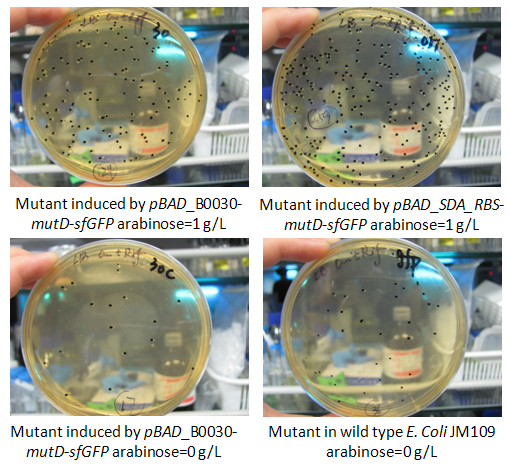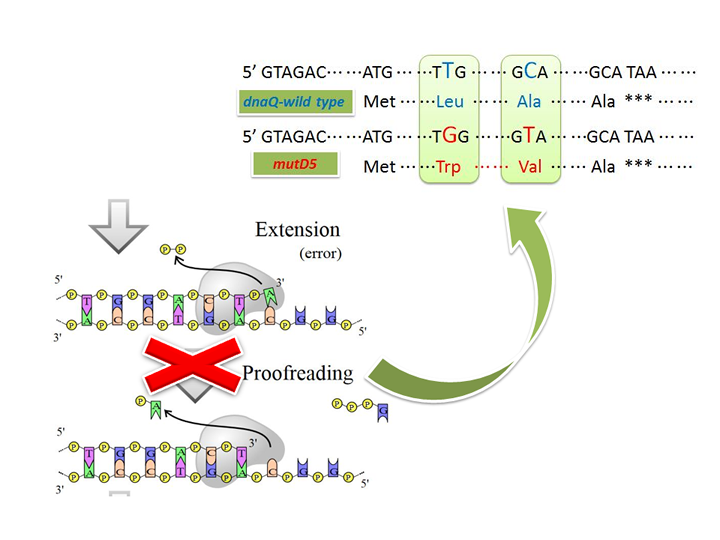Team:Tsinghua-E/Part1
From 2013.igem.org
(Difference between revisions)
| Line 20: | Line 20: | ||
</div> | </div> | ||
<div class="neirong" style="height:1625px;"> | <div class="neirong" style="height:1625px;"> | ||
| - | <h2>Part 1: THU-E Mutation Part</h2> < | + | <h2>Part 1: THU-E Mutation Part</h2> |
| - | < | + | </html><html> |
| - | + | [[File:Mut.jpg|446px|thumb|right]] | |
| - | + | A plasmid used for the construction of high-diversity library in vivo ingenome level. In this vector, highly error-prone <em>dnaQ</em> mutant, <em>mutD</em><a href="#_ENREF_1" title="Lou, 2012 #499">1</a> was cloned downstream of <em>araBAD</em> promoter to control the mutation rate of the target genome by the concentration of <em>araBAD</em> promoter’s inducer, L-arabinose, in a strict manner.<em>E. Coli</em> JM109 carrying different vectors of pBAD_B0030-<em>mutD</em>-<em>sfGFP</em>, pBAD_B0032-<em>mutD</em>-<em>sfGFP</em> and pBAD_SDA_RBS-<em>mutD-sfGFP</em>(this RBS sequence was derived from the RBS sequence upstream of sfGFP in original AraC_pBAD_CI_OR222-sfGFP vector<a href="#_ENREF_2" title="Lou, 2012 #499">2</a>)were constructed. By detecting the induced fluorescence intensity, we found that pBAD_B0030-<em>mutD</em>-<em>sfGFP</em>, andpBAD_SDA_RBS-<em>mutD- sfGFP</em>have relatively higher <em>mutD</em> expression. The increaseof mutation rate induced by our mutation part was measured by quantifying the reversion of rifampinresistance caused by mutation in genome.pBAD_SDA_RBS-<em>mutD- sfGFP</em>could increase the genome mutation rate up to 10 times compared with negative control with 1g/L induction concentration of L-arabinose. <br /> | |
| - | + | </html><html> | |
| - | + | ||
<p align="center"><br /> | <p align="center"><br /> | ||
<img border="0" width="446" src="/wiki/images/7/70/Part1I.png" /> <br /> | <img border="0" width="446" src="/wiki/images/7/70/Part1I.png" /> <br /> | ||
Revision as of 15:43, 23 September 2013



Part 1: THU-E Mutation Part
[[File:Mut.jpg|446px|thumb|right]] A plasmid used for the construction of high-diversity library in vivo ingenome level. In this vector, highly error-prone dnaQ mutant, mutD1 was cloned downstream of araBAD promoter to control the mutation rate of the target genome by the concentration of araBAD promoter’s inducer, L-arabinose, in a strict manner.E. Coli JM109 carrying different vectors of pBAD_B0030-mutD-sfGFP, pBAD_B0032-mutD-sfGFP and pBAD_SDA_RBS-mutD-sfGFP(this RBS sequence was derived from the RBS sequence upstream of sfGFP in original AraC_pBAD_CI_OR222-sfGFP vector2)were constructed. By detecting the induced fluorescence intensity, we found that pBAD_B0030-mutD-sfGFP, andpBAD_SDA_RBS-mutD- sfGFPhave relatively higher mutD expression. The increaseof mutation rate induced by our mutation part was measured by quantifying the reversion of rifampinresistance caused by mutation in genome.pBAD_SDA_RBS-mutD- sfGFPcould increase the genome mutation rate up to 10 times compared with negative control with 1g/L induction concentration of L-arabinose.

Figure.2 rifampicin reversion mutants caused by mutD expression and the counts by agar plate

Figure.3 Conception illustration of the working mechanism of mutD
1 Schaaper, R. M. MECHANISMS OF MUTAGENESIS IN THE ESCHERICHIA-COLI MUTATOR MUTD5 - ROLE OF DNA MISMATCH REPAIR. Proc. Natl. Acad. Sci. U. S. A. 85, 8126-8130,doi:10.1073/pnas.85.21.8126 (1988).
2 Lou, C. B., Stanton, B., Chen, Y. J., Munsky, B. & Voigt, C. A. Ribozyme-based insulator parts buffer synthetic circuits from genetic context. Nature Biotechnology 30, 1137-+, doi:10.1038/nbt.2401 (2012).
 "
"
